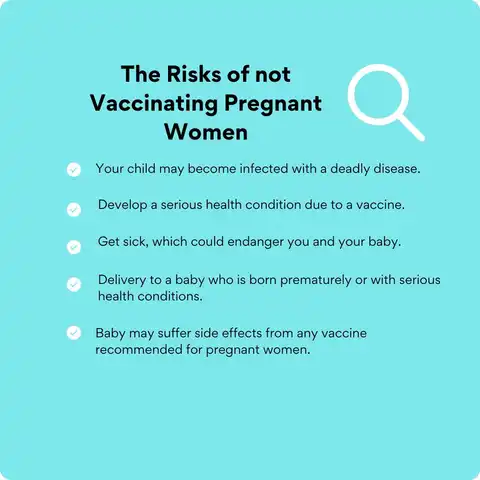Choosing the perfect pregnancy vaccination schedule is a hotly debated topic, with many women opting to forego vaccinations altogether. However, there is evidence that all vaccinations should be administered at some point in a pregnant woman’s life. This article will discuss the science behind vaccinations recommended for pregnant women and outline the optimal schedule.
The pros and cons of the perfect pregnancy vaccination schedule.
There are pros and cons to every pregnancy vaccination schedule, so it is important to discuss with your healthcare provider what is best for you and your fetus. Some pregnant women choose to receive all their vaccinations at once, while others administer them in a staggered fashion over a longer period.
There are many benefits to vaccination during pregnancy, including reducing the risk of various congenital disabilities, infections, and illnesses. However, there are also risks associated with not vaccinating pregnant women, such as contracting preventable diseases.
Vaccination during the first two trimesters of pregnancy is generally recommended, but this is still a personal choice for each pregnant woman. The safest way to administer vaccines to pregnant women is to do so in a staggered fashion, depending on the vaccine being administered.
The history of vaccination in pregnancy.
In the early days of human history, humans were susceptible to various diseases. In an attempt to protect themselves, early humans began to use vaccines. Vaccines consist of extracts or antibodies from viruses or other organisms that have caused disease in other organisms. By administering these extracts or antibodies to other organisms, people could help to prevent themselves from contracting the same diseases.
Over time, vaccines have undergone many changes. However, their basic purpose has remained the same- to protect people from various diseases. Many pregnant women were required to receive vaccinations during the early years of vaccination to protect their unborn children. Today, most pregnant women are given a series of vaccinations throughout their pregnancy to provide them with protection from a variety of potential health risks.
The benefits of vaccination for pregnant women are legion. In addition to providing them with protection against various diseases, vaccination during pregnancy has been shown to improve the baby’s health in several ways. For example, vaccination has decreased the baby’s chances of developing asthma and other respiratory issues. It has also been shown to reduce the chances of the baby developing autism or other mental health disorders.
The risks associated with not vaccinating pregnant women are significant. Not only can these women endanger their health, but they can also endanger their unborn child’s health. By not vaccinating their baby, pregnant women risk vulnerability to dangerous pathogens such as measles, whooping cough, and whooping crane virus. In addition, they are putting their baby at risk of contracting serious childhood diseases such as polio and Hib disease.
Fortunately, there are multiple methods by that pregnant women can protect themselves and their unborn children from the potential side effects of vaccination. For example, they can decide to receive their vaccinations at a healthcare provider specializing in providing vaccinations to pregnant women. They can also ensure that their baby is protected from the potential side effects of vaccines by consuming healthy foods and beverages rich in antioxidants and different protective substances.
The types of vaccines that are recommended for pregnant women.
Various vaccines are recommended for pregnancy vaccination schedules, depending on the health condition they are attempting to prevent. The standard vaccines that are suggested for pregnant women are the flu vaccine, the HPV vaccine, and the DTaP vaccine.
The flu vaccine is a great method to prevent respiratory illnesses like the flu. The HPV vaccine protects against cervical cancer and other kinds of cancer. The DTaP vaccine aids protect against diphtheria, tetanus, and pertussis, all potentially deadly diseases.
You must speak with your medic about vaccines suggested for you and your baby. Vaccines have different advantages and risks, so it is important to know what you and your baby are into.
The benefits of vaccination for pregnant women.
As we know, vaccination is one of the effective methods to prevent disease. Vaccination can protect the pregnant woman and her fetus from serious health issues. Some advantages of vaccination during pregnancy include a decreased risk of several types of congenital disabilities, short-term boosts in the pregnant woman’s immune system, and protection against other illnesses. However, there are also risks associated with not vaccinating pregnant women, so pregnant women must discuss their vaccination choices with their doctor. Additionally, it is necessary to be mindful of which vaccines are secure to offer to a pregnant woman and when they should be given.
The risks of not vaccinating pregnant women.

The Risks of not Vaccinating Pregnant Women
Many risks are associated with not vaccinating pregnant women for you and their babies. Not vaccinating can put both of you at risk for serious illness and even death. Some of the risks associated with not vaccinating pregnant women include the following:
- Your child may become infected with a deadly disease.
- Your child may develop a serious health condition due to a vaccine.
- You may get sick, which could endanger you and your baby.
- You may give delivery to a baby who is born prematurely or with serious health conditions.
- You and your baby may suffer side effects from any vaccine recommended for pregnant women.
The safest way to administer vaccines to pregnant women.
Vaccine administration during pregnancy can be a scary prospect, but making sure you follow all of the safety guidelines can make the experience much less anxiety-provoking. One of the most important things to remember when administering vaccines is to consider your health and the health of your fetus.
If you are pregnant, consult your doctor or nurse practitioner about what vaccines are recommended for you and when to receive them. Be sure to keep all your vaccination records if you are questioned about them. And, if you experience any side effects after receiving a vaccine, be sure to tell your doctor or nurse practitioner, as they may be able to provide relief.
The best time of the day to administer vaccines to pregnant women.
There is no one-size-fits-all answer to this question, as the best time of the day to administer vaccines to pregnant women will vary depending on the person and their specific needs. However, there are a few general recommendations that can be followed.
Some believe that vaccines should be administered early in the morning or at night when the body is at its weakest. These times of day offer the best opportunity for a smooth, uninterrupted vaccine reaction. Additionally, these times tend to be less hectic and allow for better vaccine absorption into the body.
Others argue that vaccinations should be staggered so that they do not put undue stress or pressure on the body. By administering them in a staggered fashion, pregnant women can minimize any potential side effects while still receiving all of the recommended vaccinations. Staggered vaccination schedules also allow for a more customized pregnancy vaccination schedule for each individual. This can be especially beneficial for pregnant women who may have allergies to certain vaccine ingredients.
There is no right answer regarding timing vaccines during pregnancy, as each woman will have different needs and preferences. However, following a tailored schedule that considers these factors is usually the safest action.
Tips for selecting a vaccine provider for pregnant women.
When selecting a vaccine provider, it is important to consider various factors, such as their qualifications and experience. It is also important to ensure the provider is qualified to administer vaccines to pregnant women. In addition, it is important to ask about the safety of the vaccines being provided and to be trained to administer them properly. Furthermore, it is crucial to always talk with your healthcare provider about your pregnancy vaccination schedule and preferences.
Ways to protect yourself and your fetus from potential side effects of vaccination.
You can do a few things to protect yourself and your developing fetus from the potential side effects of vaccinations. First and foremost, always consult with your doctor before deciding on pregnancy vaccinations. You will need to know the risks and benefits of each vaccine and any medical conditions that might contraindicate vaccination.
Some pregnant women choose to forego vaccinations altogether, but this is not advised. Vaccines are safe when administered properly, but there is always the potential for side effects. If you do choose to Vaccinate during pregnancy, be sure to avoid getting vaccinated at a time when you are susceptible to disease. And, as with any medical procedure or medication, use common sense when selecting a vaccine provider for pregnant women.
The most important thing for pregnant women is to consult with a healthcare provider about their pregnancy vaccination schedule. It is important to research the recommended pregnancy vaccination schedule to ensure pregnant women get all of the recommended vaccines. There are many benefits to getting vaccinated while pregnant, but there are also some risks. It is important to weigh the pros and cons before making a decision.
What are the possible side effects of being vaccinated during pregnancy?
A few different types of side effects can occur after being vaccinated during pregnancy. Some mild side effects include fever, a mild rash, and headaches. However, some more serious side effects can occur. These side effects can include seizures and even death. It is important to speak with your doctor about the vaccines you are considering receiving during pregnancy, as some may be contraindicated. Tell your doctor immediately if you experience any side effects after being vaccinated.
One of the most important things you can do to avoid getting sick is to follow vaccination guidelines during pregnancy. Even if you are not pregnant, most vaccines are recommended for children aged 2-18. Doing this may prevent future pregnancies from being affected by these serious side effects.
What should you do if you are unsure about a vaccine and want to avoid it?
If you are unsure about a vaccine and want to avoid it, there are a few things you can do. First, you can read the vaccination information sheet (VIS). This sheet will explain the benefits and risks of the vaccine, as well as any exemptions that may be available. Additionally, you can talk to your doctor. If you still have doubts about whether or not you should be vaccinated, they will be able to help you make a decision. However, keep in mind that some vaccines are only recommended for pregnant women when the vaccine’s safety has been verified. Lastly, if you decide to vaccinate your baby, get the specific vaccine recommended by your doctor.
Can I vaccinate my baby before they are born?
If you want to vaccinate your baby before they are born, it is important to ensure that you are fully aware of the risks and benefits associated with doing so. Although some risks are associated with vaccinating your baby pre-birth, it is often considered one of the best ways to protect both the mother and the baby.
There are a few vaccines that are particularly harmful to pregnant women. These include the HPV vaccine, which can cause serious abnormalities in the baby’s brain and nervous system, and the mumps vaccine, which can cause severe mental health complications in the baby. It is also important to note some exemptions to being vaccinated during pregnancy – so be sure to speak with your doctor if you have any questions or concerns.
Although vaccination during pregnancy does come with some risks, it is often considered one of the best ways to protect both mother and child. Vaccination during early pregnancy is safe for both mother and child, and there are no known side effects associated with vaccination.
Although vaccinating your baby before they are born is a personal decision, it is always important to weigh the pros and cons with your doctor. In some cases, vaccination may be necessary for your baby to be protected from certain diseases. However, it is always important to consult with a healthcare provider to understand your situation accurately. Read Also: 60+ Best Practices Hourly Schedule Template Excel & Word
What about my other children? Do they need to be vaccinated?
There is no one-size-fits-all answer to this question, as deciding whether to vaccinate your other children depends on the individual situation. However, there are a few reasons why you may want to consider vaccinating your other children.
To start with, vaccination is one of the best ways to protect both the mother and the baby. In some cases, vaccines can even help to prevent diseases from causing serious health problems. Vaccinations also offer many benefits for children beyond childhood, such as increasing their chances of attending school and reducing the risk of getting sick in later life.
However, not everyone agrees that all vaccines are good for children. Some parents choose not to vaccinate their children because they believe vaccines are harmful. However, research has shown that most vaccines are very safe. There are very few side effects associated with vaccinations during pregnancy.
Although it is not always necessary to vaccinate all of your children, weighing the benefits and risks before making a decision is important. Talk to your doctor if you are pregnant and unsure about a vaccine. They will be able to help you make an informed decision about whether or not to get vaccinated.





